Cameron II cabinet
David Cameron was Prime Minister of the United Kingdom from May 11, 2010 . In the British general election on May 7, 2015, Cameron's party, the Conservative Party ("Tories"), received 36.9% 0.8 percentage points more votes than in the 2010 election and received an absolute majority of the MPs (a consequence of majority voting ). The previous coalition with the Liberal Democrats was now followed by a sole government of the "Tories".
As a result, Cameron now had five more cabinet posts to give to party friends than in his previous cabinet . On March 18, 2016, Iain Duncan Smith unexpectedly resigned as Secretary of Labor and Pensions. Cameron appointed the Minister for Wales Stephen Crabb to succeed him the next day . On June 23, 2016, 51.9% of the voters voted for a Brexit ; shortly thereafter, Cameron announced his resignation as soon as the Tories elected a new party leader. After Andrea Leadsom withdrew her candidacy, Theresa May was the only candidate; she became party leader on July 11th . Cameron and his cabinet were in office until July 13, 2016. May took over some ministers from the Cameron cabinet to her cabinet .
Cabinet positions
| Office | Official | |
|---|---|---|
|
Prime Minister First Lord of the Treasury Minister for Public Service |
David Cameron |
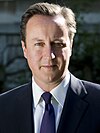
|
| First Minister Chancellor of the Exchequer |
George Osborne |

|
| Minister of the Interior | Theresa May |
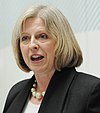
|
| Minister for Foreign and Commonwealth Affairs | Philip Hammond |
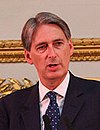
|
| Minister of Defense | Michael Fallon |

|
|
Lord Chancellor Minister of Justice |
Michael Gove |
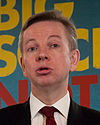
|
|
Lord President of the Council Leader of the House of Commons |
Chris Grayling |

|
| Minister of Education Minister of State for Women and Equality |
Nicky Morgan |

|
| Minister for Energy and Climate Change | Amber Rudd |

|
| Minister for Enterprise, Innovation and Skills | Sajid Javid |

|
| Minister for Culture, Media and Sport | John Whittingdale |

|
| Minister for Labor and Pensions | Stephen Crabb |

|
| Minister of Transport | Patrick McLoughlin |

|
| Minister for the Environment, Food and Rural Areas | Elizabeth Truss |

|
| Minister for Municipalities and Local Self-Government | Greg Clark |

|
| Minister for International Development | Justine Greening |
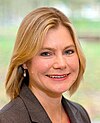
|
| Minister for Northern Ireland | Theresa Villiers |

|
| Minister of Health | Jeremy Hunt |
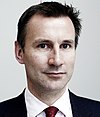
|
| Minister for Wales | Alun Cairns |

|
| Minister for Scotland | David Mundell |
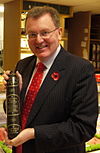
|
| Other participants in cabinet meetings | ||
|
Chief Whip in the House of Commons Parliamentary Secretary in the Treasury |
Mark Harper |

|
| Leader of the House of Lords Lord Seal Keeper |
Tina, Baroness Stowell of Beeston |

|
| Minister of State for Labor | Priti Patel |

|
| Minister with no portfolio | Robert Halfon |

|
| Minister of State for SMEs | Anna Soubry |

|
| Chief Secretary of the Treasury | Greg Hands |

|
| Minister for Cabinet Affairs Paymaster General |
Matthew Hancock |

|
| Chancellor of the Duchy of Lancaster | Oliver Letwin |

|
| Minister of State in the Department of Foreign and Commonwealth Affairs | Joyce, Baroness Anelay of St Johns |

|
| Mayor of London | Boris Johnson |

|
| Participants in the cabinet meeting if necessary | ||
| Attorney General (Attorney General) | Jeremy Wright |

|
Web links
- Election 2015: Who's Who in David Cameron's new cabinet , BBC News, May 11, 2015
- David Cameron's new cabinet lineup , The Guardian , May 11, 2015, interactive presentation
Footnotes
- ↑ Boris Johnson is allowed to have a say
- ↑ theguardian.com: A compromise too far ': Iain Duncan Smith's resignation letter in full
- ↑ Great Britain: Minister resignation increases risk of Brexit . SPIEGEL ONLINE . March 19, 2016. Retrieved April 2, 2016.
- ↑ see also en: Conservative Party (UK) leadership election, 2016
- ↑ Ministerial appointments , as of May 14, 2015. Accessed May 15, 2015 .
- ^ London Mayor Boris Johnson as a participant in cabinet meetings. Retrieved May 15, 2015 .